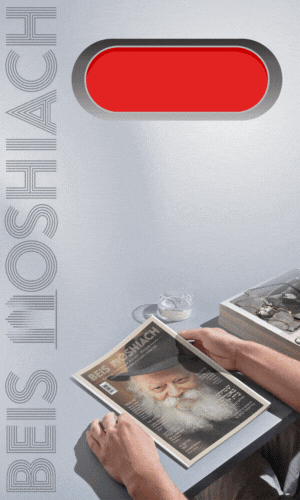The Three Crowns, Can We Get Them Today?
In this week’s parsha we mention the ‘building instructions’ for the Aron Habris. The Aron was decorated with three gold wreaths – three crowns with which Hashem crowned us • Read More
BEGIN WITH A GRIN
Someone was looking for a dentist so he could get a crown on his tooth. By mistake, he went into a law office which was located in a multi-story building.
“Excuse me, do you install crowns here?”
The secretary said, “No, sir, here we skin you alive!”
THE CROWN JEWEL
This week’s parsha, Teruma, is about the Mishkan and its utensils. The first utensil is the Aron which was the centerpiece of the Mishkan and expressed its purpose. It contained the Luchos, the broken, first Luchos, and the Sefer Torah which Moshe wrote at the end of his life. Our Sages in the Medrash find in the description of the construction of the Aron a detailed explanation for the right way to learn Torah and how to regard Torah.
First, it says in the Medrash, why is it that with all the utensils of the Mishkan the verb is “you shall make” (v’asisa), in the singular, while with the aron it says, “you shall make” (va’asu), in the plural? “Rabi Yehuda ben Rabi Sholom said: G-d said to him [Moshe], ‘All shall come and engage in [the construction of] the Aron, so that all will merit Torah.’” From this we learn that the Torah in general, and Torah study in particular, belongs to all, not just to rabbanim and wise people; to men, women and children!
Furthermore, the Aron had a gold crown around it. Not only the Aron had a crown but also the Shulchan and Gold Mizbeach. The Medrash teaches us that those crowns symbolize the three crowns with which G-d crowned the Jewish people when He chose them as a people. The crown on the Table symbolizes malchus (kingship), the crown on the Mizbeach symbolizes kehuna (priesthood), and the crown on the Aron symbolizes Torah.
The Rambam (Talmud Torah 3:1) states, “Aharon merited the crown of priesthood” (and it belongs to the family of kohanim. “Dovid merited the crown of malchus” (and it belongs to his descendants until Moshiach). In contrast, “The crown of Torah is placed and stands and is available for all, as it says (Devarim 33:4), ‘a legacy for the community of Yaakov.’ Whoever wants it should come and take it.”
The Kli Yakar finds an allusion to this. Regarding the making of the gold crown for the Table and the Mizbeach it says, “and make for it,” but with the crown for the Aron it says, “and make on it,” because the crown of Torah is not only for “it,” one person, but “on it,” for whoever wants to come and take it!
What is this precious crown and how can we obtain it? And what is the connection between the crown and Moshiach and the true and complete Geula?
EVERY JEW’S CROWN
The crown of Torah represents loftiness and majesty, like the crown of a king which elevates the wearer to a higher level, a sublime level he didn’t think he would ever attain. The Rambam (ibid) describes the person who merits the crown of Torah as a person who does not divert his consciousness from it until he and the Torah become one entity. The Torah is not merely an add-on, like a person who acquired wisdom. It is his very being so that he minimizes his work and dedicates just a little of his head space and time to his occupation, just to sustain himself. In his free time, mainly at night, he invests all his energy in learning and doesn’t waste even one night without Torah study, because to him, the Torah is “our life and the length of our days,” and one cannot disconnect from life for even a moment!
Whoever makes even a minimal, honest spiritual accounting will admit that he has not yet attained such a level of Torah study. Some learn more and some less, but those to whom the Torah is their life are few (unfortunately).
However, don’t worry. We will all merit this crown! Because in the end, in the era of Geula, each of us will be able to devote ourselves to Torah endlessly, without any outside interference, such that we a-l-l will merit the crown of Torah!
The state of the world in the era of the Geula, is an optimal state in which there is no suffering and problems, no money difficulties and no war. There is no distracting and demoralizing news cycle and no yetzer hara that explains why it’s truly impossible to concentrate on learning. This is the ultimate state in which every Jew will be able to devote himself to learning Torah in such a way that Torah will be his entire existence.
The Torah alludes to this in its description of the gold crown on the Aron. This crown symbolizes the crown of Torah which we will all merit in the era of the Geula! What will happen until then? And what can we learn from this today?
The Rebbe innovates that even today, each of us can be on the level of “Torah is his occupation” and be crowned with the crown of Torah. One doesn’t need to wait for the Geula for this. Even someone who is busy supporting his family can fill every free moment with Torah study, shutting the landline (if someone still has one), shutting the mobile phone, and devoting himself to Torah, without answering emails, without checking texts and whatsapp; just immersing himself in Torah. Even if it’s one hour every day, or less, but during this time he wears the crown of the King which is the holy Torah.
As the Rebbe puts it (Shavuos 5731), “As he learns… the world does not exist. He learns like a yeshiva bachur! Not like the manager of a bank, not like a chimney sweep, not like a shoemaker, and not even like the president of the United States. He doesn’t even hear the phone ringing as he learns!”
TO CONCLUDE WITH A STORY
We will end with a story about Reb Moshe, a Chassid of the Mittler Rebbe, who was brilliant and a genius in Torah. Since he also needed to make a living, he tendered a bid in a government auction for a factory that manufactured beer. Hashem helped and he won. Among the clauses in the contract for the lease it said that government representatives could show up at any time and R’ Moshe had to open the factory without delay. If he would not do so, he could be heavily fined and jailed.
Despite his business, R’ Moshe had set times for learning. Every day he was closed off in his room for three hours for learning and it was like the world did not exist. Everyone knew he was unavailable at this time.
One day, right after he locked his door to sit and learn, government representatives showed up at the factory to make an inspection. The family and workers who were worried about his livelihood and his life, tried to get him to open the door or get in through the window but nothing helped. R’ Moshe did not stop learning.
The officials thought he was involved in some shady practices and were already thinking about what fines to impose on him. After hours of learning, R’ Moshe invited the irate inspectors into his office, gave them all the documents and opened the factory to them. The officials, seeing that all was as it should be and that this was an extremely trustworthy person, asked him why he had delayed responding, knowing that he could lose the factory and more.
R’ Moshe said: I signed the contract for the factory, but did not sign for my Torah study, and I gave nobody ownership of it!
The officials approved the continuation of the lease and even said they wouldn’t come and inspect him again.
Good Shabbos!
32
Join ChabadInfo's News Roundup and alerts for the HOTTEST Chabad news and updates!










































